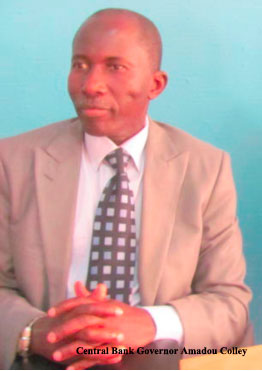
Over the last three months The Gambia has been experiencing an imbalanced situation in the foreign exchange market that has warranted Government authorities, through the Central Bank of The Gambia, to intervene in the market with various control mechanisms.
In early June this year the exchange rate of the Gambian dalasi to major foreign currencies such as the US dollar, the British pound, the Euro and the CFA, started taking an escalating drive with the value of the dalasi dropping rapidly by the day against these foreign currencies, which have become scarce in the system.
The deal has over the months become a one-sided affair as forex operators and dealers keep buying foreign currencies from the public but are not selling in return, thereby creating a situation of “artificial shortage” of forex in the system, which has resulted in the escalation of prices of commodities in the country.
This situation has forced the government to issue press releases warning against foreign currency hoarding as well as imposing a moratorium on dollar shipping out of the country. It has also caused the authorities to fix dollar exchange rate at D37 and lately D35.
In July the government also lifted the ban on the shipment of forex out of the country, with the aim of reaching a common ground with forex operators.
Since the situation could not be normalized by all these actions by government, it has been compelled to declare all foreign exchange bureau licences null and void and call for fresh registration by forex operators while all bureaus remain closed.
While this latest move by government is however out to sanitize the forex market, the current state of affairs has created serious constraints for the people and serves as a major cause for concern, as each passing day without the services of these operators, the populace is made to suffer setback in their movement in and out of the country and the economy is also in a way gravely affected since a major chunk of remittances that enter The Gambia each day through routes other than the ones operated by commercial banks could not enter the country or reach the people.
It is very essential that the process of registering forex bureaux is carried out speedily to get them operational as they play a vital role in the financial system that commercial banks do not.
Forex bureaus have become part of the greater national economic ecosystem since they provide great service to the general public and assist the government in its drive to attain its goal of making sure the entire population of The Gambia has easy access to finance. This sector of the economy also creates jobs, wealth and access to finance through its expanded branch network across communities in The Gambia.
It is also vital to consider that they handle “less than 15% of the total transaction volumes of the forex market”.
All that is needed between them and the government is proper understanding and dialogue as both are out to serve the nation, and maintain a stable and prosperous economy. Controlling the exchange rate system is rightly in place albeit to a certain level.
In drawing a conclusion to this situation I would like to quote economists Graham Bannock and William Manser, who give a well-thought out definition and facts about exchange control.
They say: “Exchange control is a method by which governments seek to control the exchange rate of their national currency and to preserve the national reserves, consisting in the imposition of limitations or prohibitions on the movement of currency across national frontiers.
“Exchange control normally operates on payments to foreigners, since these place an immediate demand on foreign currency holdings; receipts of foreign currency and of domestic currency originating from abroad are also frequently controlled. Exchange control in the main operated on the capital account of the balance of payments, too great a restriction on the current account being likely to endanger the country’s essential trade.
“Restrictions on the capital account may take the form of an outright ban on the use of foreign currency for portfolio investment, and restrictions on the type and conditions of direct investment that may be tolerated. Foreign currency for private travel is nearly always strictly controlled.
“All industrialized countries have, over time, enforced exchange control; some forms still being maintained, e.g. by France and Italy. The UK operated comprehensive exchange control from the Second World War until 1979, when it was abolished. In the USA the interest equalization tax, and in Germany the Bardepot, had exchange control purposes. Many developing countries now maintain exchange control. The International Monetary Fund, the Organization for Economic Cooperation and Development and the European Union have all striven for its elimination.”

